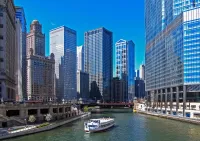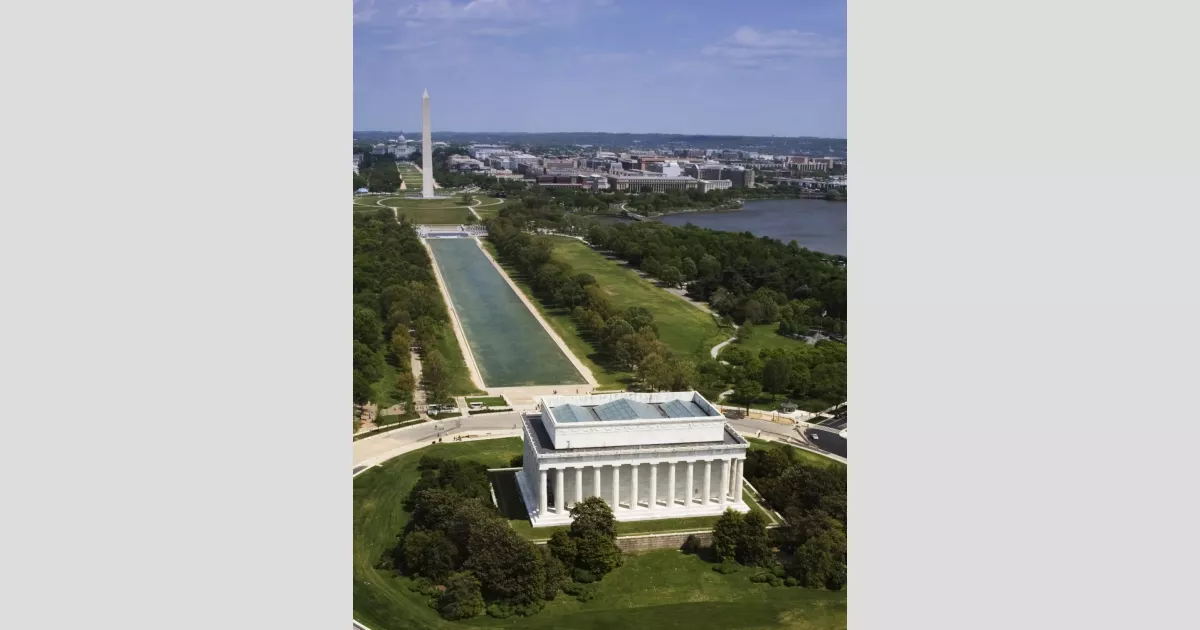Washington, D.C. is the capital city and federal district of the United States. Bordered by Maryland and Virginia, it was named after George Washington, the first U.S. president, and the district is named after Columbia, a female personification of the nation. As the seat of the U.S. government, it houses important federal buildings, monuments, and museums. It's a hub for politics, history, and culture.
1901: Finalization of the McMillan Plan
In 1901, the McMillan Plan was finalized, aiming to beautify Washington's ceremonial core, including landscaping the Capitol grounds and National Mall, clearing slums, and establishing a new citywide park system.
1908: Synagogue Built
In 1908, the Sixth & I Historic Synagogue was built in the Chinatown section of Washington, D.C.
1910: Height of Buildings Act
In 1910, the federal Height of Buildings Act limited building height in Washington, D.C., based on the width of the adjacent street, with maxima of 90 feet on residential streets and 130 feet on commercial ones.
August 6, 1918: Record high temperature
On August 6, 1918, Washington, D.C., recorded its highest temperature of 106 °F (41 °C).
1922: Largest snowstorm since 1885
From January 27 to 28, 1922, Washington, D.C., officially received 28 inches (71 cm) of snowfall, marking the largest snowstorm since official measurements began in 1885.
1925: U.S. Navy Band Headquarters
In 1925, the United States Navy Band, founded in, had its headquarters at the Washington Navy Yard.
July 20, 1930: Record high temperature
On July 20, 1930, Washington, D.C., recorded its highest temperature of 106 °F (41 °C).
1935: Supreme Court Building Completion
The United States Supreme Court Building was completed in 1935 in Washington D.C.
1938: Flag Adoption
The flag of Washington, D.C. was adopted in 1938 and is a variation on George Washington's family coat of arms.
1940: African American population
In 1940, African American residents composed about 30% of Washington, D.C.'s total population.
1950: Peak population
By 1950, Washington, D.C.'s population reached its peak of 802,178 residents.
1950: Arena Stage Founding
Founded in 1950, Arena Stage achieved national attention and spurred growth in the city's independent theater movement.
1957: Islamic Center Opening
In 1957, the Islamic Center of Washington opened, becoming the largest mosque in the Western Hemisphere at the time.
1958: Ben's Chili Bowl Founding
In 1958, Ben's Chili Bowl was founded on U Street in Washington D.C.
1961: District granted presidential voting rights
In 1961, the 23rd Amendment was ratified which granted the people of the Washington, D.C., the right to vote for the president.
1961: Ratification of the Twenty-third Amendment
In 1961, the Twenty-third Amendment to the United States Constitution was ratified, granting Washington, D.C., three votes in the Electoral College.
1961: Presidential electors
In 1961, the Twenty-third Amendment was passed, allowing Washington, D.C. voters to choose three presidential electors.
1961: Lowest total since 1961
In 2012 there was a historic low of 88 murders, the lowest total since 1961.
1964: Construction of the Capital Beltway
In 1964, the Capital Beltway, Washington, D.C.'s highway loop, was constructed, geographically demarcating the area that is referred to as "Inside the Beltway".
1964: First Electoral Votes
Since it was granted electoral votes in the 1964 presidential election, Washington, D.C. has voted consistently for Democratic presidential candidates.
April 4, 1968: Riots following Martin Luther King Jr.'s assassination
On April 4, 1968, riots erupted in Washington, D.C., following the assassination of Martin Luther King Jr., primarily affecting black residential and commercial areas. Federal troops and the National Guard quelled the violence after three days, but rebuilding lasted until the late 1990s.
1968: Ben's Chili Bowl During Race Riots
During the violent 1968 race riots, Ben's Chili Bowl rose to prominence as a peaceful escape in Washington D.C.
1970: Peak of black population
By 1970, the black population in Washington, D.C., reached a peak of 70%.
1973: District of Columbia Home Rule Act
In 1973, Congress enacted the District of Columbia Home Rule Act, which provided for an elected mayor and a 13-member council.
1973: District governance
In 1973, a locally elected mayor and a 13-member council began governing the district.
1973: Home Rule Act Passage
In 1973, the Home Rule Act was passed, devolving certain Congressional powers to an elected mayor and a 13-member Council of the District of Columbia.
1975: Walter Washington becomes mayor
In 1975, Walter Washington became the first elected and first black mayor of Washington, D.C.
March 27, 1976: Opening of Washington Metro
On March 27, 1976, the Washington Metro, the city's rapid transit rail system operated by the Washington Metropolitan Area Transit Authority (WMATA), opened.
1976: GALA Hispanic Theatre Founding
Founded in 1976, the GALA Hispanic Theatre is a National Center for the Latino Performing Arts.
1976: Marine Corps Marathon Began
In 1976, the Marine Corps Marathon began and is sometimes called "The People's Marathon" because it is the largest marathon that does not offer prize money to participants.
1976: Handgun ban
In 2008, the Supreme Court of the United States held in District of Columbia v. Heller that the city's 1976 handgun ban violated the Second Amendment.
1978: District of Columbia Voting Rights Amendment passed
In 1978, the District of Columbia Voting Rights Amendment was passed, aiming to grant D.C. Congressional representation.
1986: Expiration of the District of Columbia Voting Rights Amendment
In 1986, the District of Columbia Voting Rights Amendment expired without being ratified into law.
1989: Washington, D.C. labeled worst city government
In 1989, during Marion Barry's term as mayor, Washington Monthly magazine labeled Washington, D.C. "the worst city government in America".
1990: Largest Religious Group
In 1990, Black Protestants were the largest religious group in Washington, D.C.
1991: Murders Peak in D.C.
In 1991, the number of murders in Washington, D.C. peaked at 479.
1995: Creation of the District of Columbia Financial Control Board
In 1995, at the start of Marion Barry's fourth term as mayor, Congress created the District of Columbia Financial Control Board to oversee all municipal spending.
1998: Election of Mayor Anthony Williams
In 1998, Anthony Williams won the election for mayor, subsequently overseeing a period of urban renewal and budget surpluses for Washington, D.C.
2000: Increase in the non-Hispanic white population
Between 2000 and 2010 there was a 31.4% increase in the non-Hispanic white population in Washington, D.C..
2000: Population growth
Following a half-century of population decline, Washington D.C. has experienced population growth since 2000.
2000: Largest Religious Group
In 2000, Catholics were the largest religious group in Washington, D.C.
2001: District regains control over finances
In 2001, the district regained control over its finances and the oversight board's operations were suspended.
2005: Poll reveals lack of awareness of D.C. representation
A 2005 poll found that 78% of Americans were unaware that residents of Washington, D.C., have less representation in Congress than residents of the 50 states.
2005: Poverty Level
In 2005, 19% of Washington, D.C. residents were below the poverty level, which was higher than any state except Mississippi.
2006: College Degree Attainment
In 2006, half of Washington D.C. residents held at least a four-year college degree.
2007: Increased enrollment in public charter schools
By 2007, enrollment in public charter schools in Washington, D.C., had steadily increased due to perceived problems with the traditional public school system.
2007: Illiteracy Rate
In 2007, approximately one-third of Washington, D.C., residents were functionally illiterate, which was higher than the national average.
2007: Top buildings in America
In 2007, six of the top ten buildings in the American Institute of Architects' ranking of America's Favorite Architecture were located in Washington, D.C.
2008: Nationals Park Opening
In 2008, Nationals Park opened in Washington D.C.
2008: Private school enrollment
In 2008, approximately 18,000 students were enrolled in the 92 private schools in Washington, D.C.
2008: Beginning of the SmartBike DC pilot program
In 2008, the SmartBike DC pilot program began in Washington, D.C., preceding the Capital Bikeshare program.
2008: Supreme Court Rules on Handgun Ban
In 2008, the Supreme Court of the United States held in District of Columbia v. Heller that the city's 1976 handgun ban violated the Second Amendment.
2009: HIV/AIDS Epidemic
A 2009 report found that at least three percent of Washington, D.C., residents had HIV or AIDS.
2009: GDP Per Capita Ranking
Between 2009 and 2016, gross domestic product per capita in Washington, D.C., consistently ranked at the very top among U.S. states.
2009: Legislation authorizing same-sex marriage
In 2009, legislation authorizing same-sex marriage was passed in Washington, D.C.
2009: End of student decrease in DCPS
In 2009, the number of students in District of Columbia Public Schools (DCPS) stopped its steady decrease after 39 years.
March 2010: Issuance of marriage licenses to same-sex couples
In March 2010, Washington, D.C., began issuing marriage licenses to same-sex couples.
2010: Traffic delays and commuting habits in Washington
According to a 2010 study, Washington-area commuters spent 70 hours a year in traffic delays, tying with Chicago for the nation's worst road congestion; however, 37% of Washington-area commuters used public transportation, and 12% walked to work.
2010: Arena Stage Reopening
Arena Stage reopened after a renovation and expansion in the city's emerging Southwest waterfront area in 2010.
2010: Demographics
As of 2010, about 17% of Washington, D.C. residents were age 18 or younger, the district had the lowest median age compared to the 50 states at 34 years old, and there were an estimated 81,734 immigrants living in the city.
2010: Total enrollment in charter schools
As of 2010, charter schools in Washington, D.C., had a total enrollment of about 32,000, representing a 9% increase from the previous year.
2010: Health Insurance Coverage
As of 2010, more than 90% of Washington, D.C., residents had health insurance coverage, the second-highest rate in the nation.
2010: Decrease in the black population
Between 2000 and 2010 there was an 11.5% decrease in the black population in Washington, D.C..
2010: Largest Religious Group
In 2010, Mainline Protestants were the largest religious group in Washington, D.C.
2010: Start of the Capital Bikeshare program
In 2010, the Capital Bikeshare program started in Washington, D.C.
2010: Violent Crime Reaches Lowest Levels Since 2010
In 2024, violent crimes per-capita in Washington D.C. reached their lowest levels since 2010.
2010: Student enrollment in public schools
In the 2010–11 school year, 46,191 students were enrolled in the Washington, D.C. public school system.
2010: 2010 United States census
Since the 2010 United States census, the population of Washington D.C. has increased by more than 100,000 people.
2011: Largest Companies Based
According to statistics compiled in 2011, four of the largest 500 companies in the country were based in Washington, D.C.
2011: Metropolitan Economy Ranking
As of 2011, the Washington metropolitan area was the nation's eighth-largest metropolitan economy.
2011: Union Station became intercity bus transit center
Following renovations in 2011, Union Station became Washington's primary intercity bus transit center.
2011: Primary Language
In 2011, 85% of D.C. residents age 5 and older spoke English at home as their primary language.
2011: Readership of The Washington Post
In 2011, The Washington Post had the sixth-highest readership of all news dailies in the United States.
2012: Spending on hotel beds for homeless families
During the winter of 2012, Washington, D.C., spent $2,544,454 on putting homeless families in hotels.
2012: Tourism Contribution
In 2012, approximately 18.9 million visitors contributed an estimated $4.8 billion to the Washington D.C. local economy.
2012: Murders Reach Historic Low
In 2012, the number of murders in Washington, D.C. reached a historic low of 88, the lowest total since 1961.
2012: Federal taxes paid by D.C. residents and businesses
In the financial year 2012, residents and businesses in Washington, D.C., paid $20.7 billion in federal taxes, exceeding the taxes collected from 19 states and representing the highest federal taxes per capita.
2013: Shelter law passed
In 2013, Washington, D.C. passed a law requiring shelter to be provided to everyone in need when the temperature drops below freezing.
2013: Smithsonian Visits
In 2013, the Smithsonian's locations in Washington D.C. had a combined total of 30 million visits.
2013: Commuting habits in Washington metropolitan area
In 2013, the Washington metropolitan area had the eighth-lowest percentage of workers who commuted by private automobile (75.7 percent), with 8 percent of area workers traveling via rail transit.
2013: Unprosecuted Cases almost twice of 2013
In October 2023, the rate of unprosecuted cases in Washington D.C. dropped to 56%, almost twice what it was in 2013.
2014: Absorption of the Corcoran College of Art and Design
In 2014, the Corcoran College of Art and Design, Washington, D.C.'s oldest art school, was absorbed into the George Washington University, now serving as its college of arts.
2015: Washington, D.C. joins UNPO
In 2015, Washington, D.C., became a member state of the Unrepresented Nations and Peoples Organization (UNPO).
2015: Increase of Bike lane network in DC
In 2015, Washington, D.C., increased its bike lane network by 60 percent.
2015: Homicides Decrease from 2015
In 2016, the district's Metropolitan Police Department tallied 135 homicides, a 53% increase from 2012 but a 17% decrease from 2015.
2016: Washington metropolitan area population
As of 2016, the Washington metropolitan area had an estimated six million residents, making it the sixth-largest metropolitan area in the U.S.
2016: Sale of El Tiempo Latino
In 2016, The Washington Post sold the Spanish-language newspaper El Tiempo Latino to El Planeta Media.
2016: GDP Per Capita
In 2016, Washington, D.C.'s GDP per capita was $160,472, almost three times greater than that of Massachusetts.
2016: Reintroduction of streetcar line
In 2016, Washington, D.C., reintroduced a streetcar line, DC Streetcar, which operates as a single line system in Northeast Washington, D.C., along H Street and Benning Road.
2016: Referendum on D.C. statehood
In 2016, a referendum on D.C. statehood resulted in an 85% support among Washington, D.C., voters for it to become the nation's 51st state.
2016: Homicides Increase from 2012
In 2016, the Metropolitan Police Department tallied 135 homicides in the District, a 53% increase from 2012 but a 17% decrease from 2015.
January 2017: Trump's inauguration cost the city $27 million
In January 2017, Donald Trump's inauguration cost Washington, D.C. $27 million, of which $7 million was never repaid to the city's security fund.
March 2017: D.C. statehood bill introduced
In March 2017, the city's congressional delegate Eleanor Holmes Norton introduced a bill for statehood for Washington, D.C.
2017: D.C. Public Service Commission Approves Utility Plan
In 2017, the D.C. Public Service Commission approved a seven-year, $500 million plan to bury more power lines underground.
2017: Household and Personal Income
In 2017, the median household income in D.C. was $77,649, and the personal income per capita was $50,832, higher than any of the 50 states.
2018: Report on Ex-Convict Residents
According to a 2018 report, 67,000 residents of Washington D.C., about 10% of the population, are ex-convicts.
2018: Washington, D.C. area airport system passenger traffic
In 2018, the Washington, D.C. area was the 18th-busiest airport system in the world by passenger traffic, accumulating over 74 million passengers between its three main commercial airports.
July 2019: Population estimate
As of July 2019, the U.S. Census Bureau estimated Washington, D.C.'s population to be 705,749.
2019: Trump's "A Salute to America" event
In 2019, Donald Trump's Independence Day event in Washington, D.C., "A Salute to America", cost six times more than Independence Day events in past years.
2019: Tourism Impact
In 2019, Washington D.C. saw 24.6 million tourists, including 1.8 million from foreign countries, who collectively spent $8.15 billion during their stay.
2019: Median Household Income
In 2019, Washington, D.C., had the highest median household income in the U.S. at $92,266.
2019: Construction begins to bury power lines
In 2019, construction started on the plan to bury more power lines underground in Washington D.C.
2019: D.C. Admission Act reintroduced
In 2019, the D.C. Admission Act was reintroduced for Washington, D.C.
2019: Most Popular Sports Team
In 2019, the Washington Nationals of Major League Baseball were the most popular sports team in Washington D.C.
2020: 2020 census data
According to 2020 Census Bureau data, the population of Washington, D.C., was 41.4% Black or African American, 39.6% White, 4.9% Asian, 0.5% American Indian or Alaska Native, 0.1% Native Hawaiian or Other Pacific Islander, and 5.4% Some Other Race.
2020: Think Tank Center
As of 2020, Washington, D.C. was a leading center for national and international research organizations, with 8% of the country's think tanks based in the city.
2020: Religious Adherence
In 2020, 56% of Washington, D.C.'s residents were adherents of a religious body.
2020: Washington-Baltimore combined statistical area population
In 2020, the Washington–Baltimore combined statistical area had a population exceeding 9.8 million residents, making it the third-largest combined statistical area in the country.
April 2021: House passes D.C. Admission Act
In April 2021, the U.S. House of Representatives passed the Washington, D.C., Admission Act.
2021: Walk Score ranking of Washington, D.C.
A 2021 study by Walk Score ranked Washington, D.C., the fifth-most walkable city in the United States, with U Street, Dupont Circle, and Mount Vernon Square being the most walkable neighborhoods.
2021: Bill introduced to Congress for retroceding the District to Maryland
In 2021, a bill was introduced to Congress for retroceding the District to Maryland, with the intention of providing residents with normal representation as part of a state.
2021: Failed statehood bill
In 2021, a statehood bill for Washington, D.C., passed the House of Representatives but was not adopted by the U.S. Senate.
2021: Statehood bill proposes shrinking the federal district
In 2021, a statehood bill proposed that the federal district be shrunk to an area roughly the size of the National Mall.
May 2022: Expansion of D.C. bike lane network
In May 2022, the city of Washington, D.C. celebrated the expansion of its bike lane network to 104 miles (167 km), a 60 percent increase from 2015. Of those miles, 24 miles (39 km) were protected bike lanes.
July 2022: Federal Government Employment
As of July 2022, 25% of people employed in Washington, D.C., were employed by the federal government.
2022: Homeless population estimate
According to Department of Housing and Development's Annual Homeless Assessment Report in 2022, there were an estimated 4,410 homeless people in Washington, D.C.
2022: Top Employers
According to the District's comprehensive annual financial reports, the top employers by number of employees in 2022 included Georgetown University, Children's National Medical Center, Washington Hospital Center, George Washington University, American University, Georgetown University Hospital, Booz Allen & Hamilton, Insperity PEO Services, Universal Protection Service, Howard University, Medstar Medical Group, George Washington University Hospital, Catholic University of America, and Sibley Memorial Hospital.
2022: Washington, D.C. area airport system passenger traffic in 2022
By 2022, the Washington, D.C. area airport system had climbed to 13th-busiest for passenger traffic, even though passenger numbers decreased to less than 69 million.
2022: Tourism in Washington, D.C.
In 2022, Washington, D.C., attracted an estimated 20.7 million domestic and 1.2 million international visitors, making it the seventh-most visited city in the U.S.
2022: Residents Criticize Prosecution Rates
In 2022, many D.C. residents began to press the city government for refusing to prosecute nearly 70% of arrested offenders.
2022: Most Visited Museums
In 2022, the National Museum of Natural History and the National Gallery of Art were the two most visited museums in the country.
January 2023: Statehood bill reintroduced
In January 2023, the statehood bill for Washington, D.C., was reintroduced after not progressing in the Senate.
March 2023: D.C. bike lane network in March 2023
As of March 2023, Washington, D.C. has 108 miles (174 km) of bike lanes, with 30 miles (48 km) of them protected bike lanes.
October 2023: Unprosecuted Cases Drop
By October 2023, the rate of unprosecuted cases in Washington D.C. dropped to 56%, although still higher than nine of the past 10 years and almost twice what it was in 2013.
2023: Ranking of public parks
According to the Trust for Public Land, in 2023 Washington, D.C., ranked first among the 100 largest U.S. cities for its public parks.
2023: Washington Union Station ranking
As of 2023, Washington Union Station is the ninth-busiest rail station in the nation and tenth-busiest in North America.
2023: Spike in Violent Crime
In 2023, Washington D.C. recorded 274 homicides, marking a 20-year high and a spike in violent crime.
2023: Washington metropolitan area population
In 2023, the Washington metropolitan area had a population of 6.3 million residents.
2023: Global Financial Centres Index Ranking
In the 2023 Global Financial Centres Index, Washington, D.C. was ranked as having the 8th most competitive financial center in the world.
February 2024: Council Passes Crime Reduction Bill
In February 2024, the Council of the District of Columbia passed a major bill meant to reduce crime in the city by introducing harsher penalties for arrested offenders.
February 2024: Capital Bikeshare program details in February 2024
As of February 2024, the Capital Bikeshare program in Washington, D.C. had 6,372 bicycles and 395 stations.
2024: Michelin Stars
As of 2024, 25 restaurants in Washington, D.C. have received stars in the D.C. Michelin Guide, representing the most starred restaurants per capita for any U.S. city.
2024: Violent Crime Reaches Lowest Levels Since 2010
In 2024, violent crimes per-capita in Washington D.C. reached their lowest levels since 2010.
August 11, 2025: Federal control of Metropolitan Police Department
On August 11, 2025, President Donald Trump switched control of the Metropolitan Police Department of the District of Columbia to the federal government, citing rampant crime and invoking the District of Columbia Home Rule Act.
August 2025: Crime Decreases
As of August 2025, police statistics in Washington D.C. recorded a 7% decrease in overall crime year-over-year, and a 26% decrease in violent crime.
August 2025: Trump Declares Public Safety Emergency
In August 2025, Donald Trump invoked Section 740 of the Home Rule Act to declare a public safety emergency in Washington D.C.
Mentioned in this timeline

Donald John Trump is an American politician media personality and...

Martin Luther King Jr was a pivotal leader in the...
The National Broadcasting Company NBC is a major American commercial...

News encompasses information about current events disseminated through various media...

George Washington a Founding Father served as the first U...

Chicago is the most populous city in Illinois and the...
Trending

6 months ago Paris Hilton's family stuns in matching outfits and enjoys Traverse City vacation.

2 months ago Marco Rubio's Venezuela Stance: War Sales Pitch and Social Media Influence Examined

Marc Anthony Marco Antonio Mu iz is a highly successful American singer and actor renowned as the best-selling salsa artist...

2 months ago Noah Kahan Responds Positively to 'Snooze Fest' Label for His Music.

3 months ago Patrick Dempsey stars in 'Memory of a Killer' thriller, premiering on Fox this January.

7 months ago Dana Perino Discusses Career, Advice, and Dream Dinner Guest in Interview
Popular

Thomas Douglas Homan is an American law enforcement officer who...

William Franklin Graham III commonly known as Franklin Graham is...

Jupiter is the fifth and largest planet from the Sun...

XXXTentacion born Jahseh Dwayne Ricardo Onfroy was a controversial yet...

Instagram is a photo and video-sharing social networking service owned...

Kristi Noem is an American politician who has served as...
